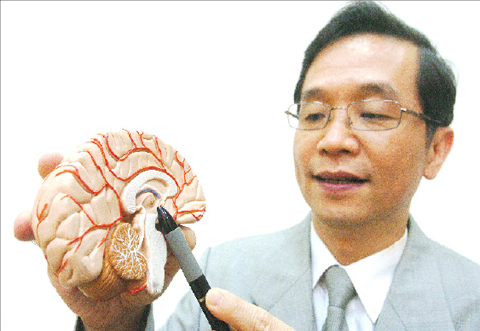The unemployment rate rose to a new high of 5.81 percent last month as more companies closed their doors or laid off workers to cope with the economic downturn, the Directorate-General of Budget, Accounting and Statistics (DGBAS) said yesterday.
On a more optimistic note, however, the statistics agency said some industries appeared to have hit bottom.
The headline unemployment rate gained 0.06 percentage points to 5.81 percent, or 630,000 people, last month, the highest level since DGBAS initiated the survey 31 years ago, the agency’s monthly report showed.

PHOTO: CHANG CHIA-MING, TAIPEI TIMES
The seasonally adjusted index increased 0.09 percentage points to 5.72 percent, higher than forecasts by UBS and Citigroup Taiwan Inc. The two banks put the rate at 5.6 percent.
“The labor market remains tough,” DGBAS Deputy Director Huang Jiann-jong (黃建中) told a media briefing. “While the unemployment rate continued rising in March, the rise slackened to a seven-month low.”
An additional 15,000 people lost their jobs in business closures or downsizing last month, Huang said, adding that the number of people working less than 16 hours a week had dropped by 27,000 amid a rush of orders from China.
The unemployment rate would have reached 6.21 percent if the government had not added 890,000 contract workers to its payroll, bringing employees in the public sector to 1.04 million, the report said.
The broad unemployment rate was 7.4 percent, up from 7.32 percent a month earlier, if non-workers such as students and housewives were included, the report said.
People aged between 45 and 64 accounted for 141,000 unemployed — an increase of 56,000, or 66 percent, from a year ago — the highest increase among all age groups, Huang said, calling attention to their predicament as many are breadwinners.
The official said the unemployment pointer would head higher in coming months when college graduates are expected to enter the market, starting next month.
“It would be better to look at the figure after seasonal adjustment,” Huang said. “The issue is not so grave if the index remains stable.”
Kevin Hsiao (蕭正義), head of UBS Wealth Management Research in Taiwan, said college graduates would have difficulty finding jobs this year.
“The economy is not expected to turn the corner until the fourth quarter and firms will not hire new workers in the absence of a robust recovery,” Hsiao said by telephone.
Polaris Research Institute (寶華綜合經究院) president Liang Kuo-yuan (梁國源) said the job market contracted for 22 months during the last downturn and that losses would be heavier losses this time around, given the severity of the crisis.
In a related development, the nominal take-home salary averaged NT$35,314 (US$1,044) per month in February, up from NT$35,130 in January, ending a downward trend in the previous four months, DGBAS said in a separate report yesterday.
However, the figures shrank by 12.13 percent in the first two months, if bonuses and dividends were also factored in, the report said.

In Italy’s storied gold-making hubs, jewelers are reworking their designs to trim gold content as they race to blunt the effect of record prices and appeal to shoppers watching their budgets. Gold prices hit a record high on Thursday, surging near US$5,600 an ounce, more than double a year ago as geopolitical concerns and jitters over trade pushed investors toward the safe-haven asset. The rally is putting undue pressure on small artisans as they face mounting demands from customers, including international brands, to produce cheaper items, from signature pieces to wedding rings, according to interviews with four independent jewelers in Italy’s main

Macronix International Co (旺宏), the world’s biggest NOR flash memory supplier, yesterday said it would spend NT$22 billion (US$699.1 million) on capacity expansion this year to increase its production of mid-to-low-density memory chips as the world’s major memorychip suppliers are phasing out the market. The company said its planned capital expenditures are about 11 times higher than the NT$1.8 billion it spent on new facilities and equipment last year. A majority of this year’s outlay would be allocated to step up capacity of multi-level cell (MLC) NAND flash memory chips, which are used in embedded multimedia cards (eMMC), a managed

Japanese Prime Minister Sanae Takaichi has talked up the benefits of a weaker yen in a campaign speech, adopting a tone at odds with her finance ministry, which has refused to rule out any options to counter excessive foreign exchange volatility. Takaichi later softened her stance, saying she did not have a preference for the yen’s direction. “People say the weak yen is bad right now, but for export industries, it’s a major opportunity,” Takaichi said on Saturday at a rally for Liberal Democratic Party candidate Daishiro Yamagiwa in Kanagawa Prefecture ahead of a snap election on Sunday. “Whether it’s selling food or

In the wake of strong global demand for AI applications, Taiwan’s export-oriented economy accelerated with the composite index of economic indicators flashing the first “red” light in December for one year, indicating the economy is in booming mode, the National Development Council (NDC) said yesterday. Moreover, the index of leading indicators, which gauges the potential state of the economy over the next six months, also moved higher in December amid growing optimism over the outlook, the NDC said. In December, the index of economic indicators rose one point from a month earlier to 38, at the lower end of the “red” light.